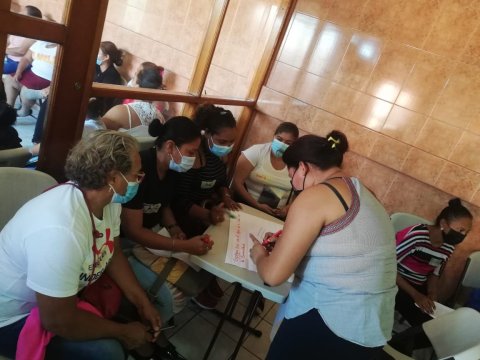
Members of MEC engaged in workshops at the MEC office on the same day as the National Assembly voted to cancel the organization's legal status.
The week of February 14, the Nicaraguan National Assembly voted to cancel the legal status of 12 Nicaraguan and international NGOs, including the country’s strongest and most outspoken defender of women maquila workers’ rights, the Maria Elena Cuadra Women’s Movement (MEC).
MSN has worked closely with MEC since its founding 28 years ago. In those years, MEC has trained thousands of women garment workers and community leaders on skills related to negotiation, mediation, and alternative conflict resolution, as well as on human and labour rights and themes related to violence against women.
On the day of the vote, MEC’s president, Sandra Ramos held a press conference in the organization’s office to denounce the decision. She presented evidence disproving the Ministry of the Interior’s claims that the organization had failed to file annual reports, lacked transparency, and had not updated its board of directors list. Sandra referred to the false claims as being perpetuated by a macho government against poor, under resourced women. “They are violating our right to organize [and] our fundamental right to employment…We defend the poorest women in this country,” she said.
This latest round of repressive moves by the Ortega administration, which has included attacks against independent media outlets, universities and prominent civil society organizations, was based on the Foreign Agents Law and other repressive legislation passed in October 2020. While the government argues that the Foreign Agents Law protects the sovereignty of the nation against foreign influence, it is clearly designed to restrict civil society organizations that disagree with the government.
Under the law, any organization that receives foreign funding and fails to register with the state as a “foreign agent” will be subject to a series of penalties, including fines, the confiscation of their assets, and the stripping of their legal standing as an organization. Since the law’s enactment, dozens of national and international organizations have been closed by the government, including numerous Nicaraguan universities, the Nicaraguan Pro-Human Rights Association (ANPDH), Oxfam Intermon, PEN International and various other development and human rights organizations. In the case of MEC, they had submitted the required paper work at the end of last year only to have it rejected and returned to them.
The October 2020 legislation and an April 2018 crackdown on political opposition have been widely criticized by human rights organizations and the international community. Over 40 human rights defenders and political dissidents have been imprisoned since 2018, including presidential hopefuls in the lead up to the November 2021 elections. In response to the crackdowns and politically motivated detentions, the European Union, the United States and Canada have imposed sanctions on top government officials, including members of the Ortega family.
On February 4 of this year, Dora María Téllez, a former guerrilla leader during the Sandinista revolution and political prisoner since June, 2021 was found guilty at a closed-door trial for alleged political conspiracy. Just over a week later, former Sandinista guerrilla, Hugo Torres, who was also jailed as part of the June crackdown, died in jail. Torres was known for his role in securing Ortega’s release when he had been a political prisoner in 1974.
Going forward, MSN will continue to work closely with MEC, as well as other allies in Central America and internationally, to ensure the continuation of MEC’s crucially important work with women workers in Nicaragua. While MEC’s office will be closed, Sandra has made it clear that its work will continue.
The day after the petition to cancel MEC’s legal status was submitted to the National Assembly, the organization continued its scheduled trainings with women workers. Even as the police arrived during the press conference at MEC’s office, women continued to organize and train themselves on their rights. “MEC is not the walls of this office, or the chairs, or the desks,” said Sandra. “MEC is the spirit of struggle, the spirit of defending the rights of Nicaraguan women. If we have to work under a mango tree again, [we will]. That’s how we started…MEC is us. MEC is the poor women of this country.”
Read the February 16 declaration signed by various Central American and international women’s and human rights organizations, including MSN, denouncing the latest round of closures and expressing solidarity with MEC. Check out MEC’s Facebook page for updates.
More from Nicaraguan and international press
- Orteguismo continues attack and calls for cancellation of six more NGOs (Confidencial)
- Former Nicaragua guerrilla who helped free Daniel Ortega dies in jail (The Guardian)
- Article about MEC closure in Spanish (La Prensa)
- Interview with Sandra Ramos in Spanish (Artículo 66)
- Article about government closures of universities in Spanish (La Prensa)